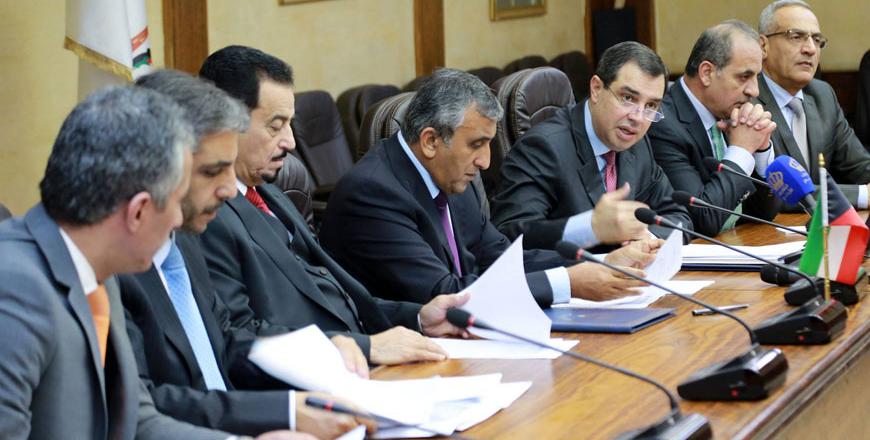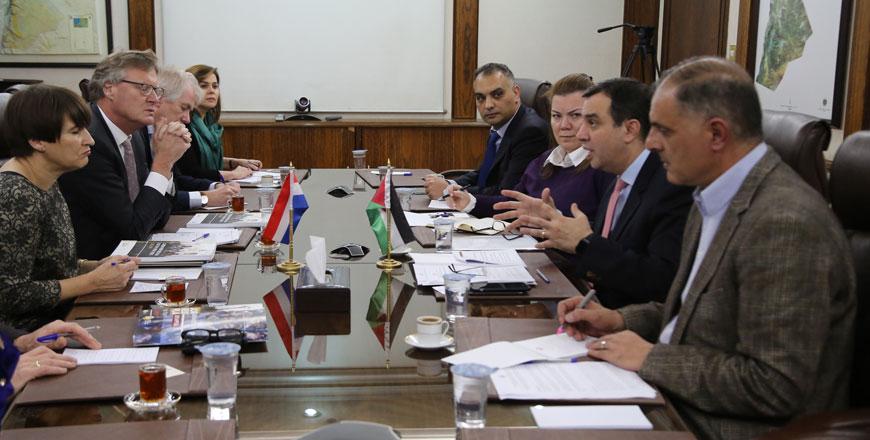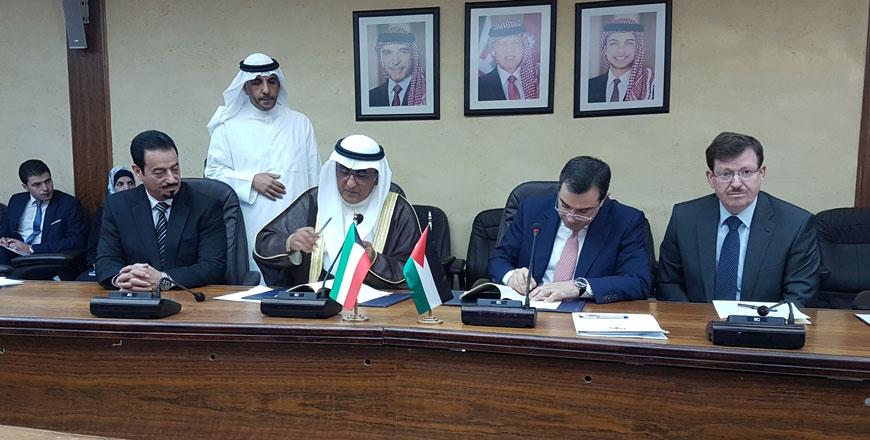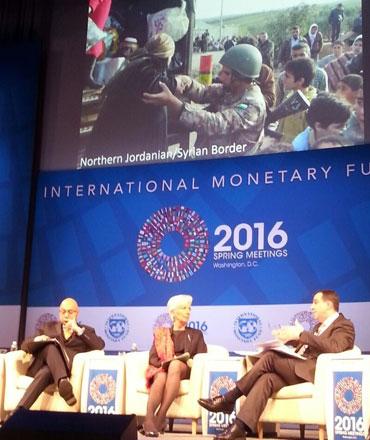You are here
Jordan would not borrow to finance refugee-related projects — Fakhoury
By JT - Jan 25,2016 - Last updated at Jan 25,2016

Minister of Planning and International Cooperation Imad Fakhoury speaks during the signing ceremony of the $20 million grant by the Kuwait Fund for Arab Economic Development to help Jordan cope with the Syrian crisis (Photo courtesy of Planning and International Cooperation Ministry)
AMMAN – The Kuwait Fund for Arab Economic Development (KFAED) on Monday extended an additional grant worth $20 million to support the Jordan Response Plan (JRP) for the Syrian refugee crisis.
The grant agreement was signed by Minister of Planning and International Cooperation Imad Fakhoury and KFAED Director General Abdulwahab Ahmad Al Bader in Amman.
A ministry statement said the grant would enhance the quality of public services in host communities in the sectors of health, education and municipal services.
Prime Minister Abdullah Ensour met with the director of KFAED and thanked Kuwait for supporting the Kingdom, the Jordan News Agency, Petra, reported.
Also on Monday, Fakhoury headed a meeting for representatives of international financial institutions and the UN, who are convening in Amman as part of the working group on the new financing initiative to support the Middle East and North Africa (MENA) region.
The working group was formed following the International Stakeholders’ Roundtable Meeting for the MENA region that took place in Lima, Peru on October 10, 2015 during the World Bank Group (WBG) International Monetary Fund (IMF) joint annual meetings.
The Roundtable Meeting focused on the two financing facilities developed by the WBG, in cooperation with the UN and the Islamic Development Bank (IDB), which aims to mobilise additional financial resources to the region to strengthen the capacity of countries and communities hosting refugees to absorb the shocks on their economic and social fabric, and to support the recovery and reconstruction of MENA countries.
Fakhoury told participants that Jordan does not intend to borrow to finance priority projects related to the influx of Syrian refugees, stressing that such schemes should be funded only through grants.
Jordan may consider high concessionary loans to finance its development priorities under the Executive Development Programme (EDP) and fiscal needs, but it may not borrow to finance priority projects related to the Syrian refugee burden even if these projects were implemented in host communities.
Amman, he said, seeks grants to fund the resilience component of the Jordan Response Plan (JRP).
“Being an upper-middle income country limits our ability to borrow at high concessionary terms, access additional grants, trust funds or guarantees that are not open to countries in this category,” Fakhoury said, as quoted in the ministry statement.
Jordan’s external environment continues to be challenging, he added. Citing the preliminary results of the recent 2015 Population and Household Census, the minister said that Jordan is now a host to about 1.3 million Syrians, and this influx, coupled with the continued impact of the regional turbulence, is impacting growth levels, investments, exports, and tourism, in addition to continued pressures on existing infrastructure and services.
“This situation constitutes a threat to the stability and overall resilience,” he added.
Briefing participants on recent updates in Jordan, the minister said Jordan has a clear roadmap represented by its 10-year socioeconomic vision, Jordan 2025, which was launched last year.
Under this vision, the government has recently adopted the new EDP 2016-2018, which outlines development projects across priority sectors that include health, local development, education, water, energy, and transport for the next three years and represents the first phase of implementing the new vision.
He said that development priorities under the EDP for the coming three years are estimated at about $14 billion and that more than 75 per cent of these priorities were accommodated in the draft 2016 budget law and the medium-term budgeting framework.
The EDP also takes into consideration the updated Governorates Development Programmes for 2016-2018.
The government adopted a new JRP for 2016-2018 that was prepared in coordination with the donor community, Fakhoury said, adding that the total cost of the response interventions under the new JRP is $8.13 billion for the next three years, of which $2.48 billion is required for refugee interventions and $2.45 billion for host communities, in addition to $3.2 billion that is required for specific budget support needs, including income losses induced by the regional crisis and some security costs, among others.
Adequately financing the JRP through grants is critical as the 2015 plan was only 36 per cent funded, of which less than 10 per cent was dedicated to improve the situation of host communities, the minister said.
JRP financing will ensure the continuation of the international humanitarian response to refugees, as well as enable Jordan sustain the continuity of the delivery of basic services to refugees and host communities in the sectors of education, energy, health, transport, municipal services and water and sanitation at improved levels rather than at regressing levels, he added.
Related Articles
AMMAN — Minister of Planning and International Cooperation Imad Fakhoury on Sunday highlighted the government's measures to follow up on the
AMMAN — The Planning and International Cooperation Ministry on Tuesday signed a $20 million grant agreement with the Kuwaiti Fund for Arab E
AMMAN – Minister of Planning and International Cooperation Imad Fakhoury on Monday described the financing facility for the region announced

















